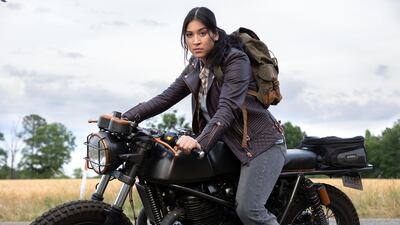On a chilly morning outside of Atlanta as Marvel’s Echo was about to begin filming, director Sydney Freeland set the tone for all that would follow.
Before the cameras began rolling, before she’d even given a welcome speech, the seasoned filmmaker stood in front of cast and crew to introduce a woman named Teri Billy, a proud member of the Choctaw Nation, so that she could deliver a traditional native blessing.
The significance of the moment was not lost on the performers and technicians, many of whom were of indigenous origins themselves. As Billy sang a hymn and followed it with a dance that had been passed down from generation to generation, something powerful entered the air.
After all, Echo is, nearly above all else, an indigenous story. In it, a native girl called Maya Lopez, played by part Mohican actress Alaqua Cox, 26, flees for her life after a nearly deadly encounter to find refuge at the Choctaw Oklahoma reservation she once called home.

While the character has appeared in the world of Marvel before, this was an opportunity to not only to bring us into her world, but to properly honour her culture, something Hollywood has never done before.
“Representation was the most important thing of all for us,” Freeland tells The National.
While native stories have been a part of American film and television since the beginnings of the art form, they have rarely been shown the respect they deserve. That was made startlingly clear earlier this week when Lily Gladstone stood on stage as the first indigenous person to win the Golden Globe for Best Actress.
“In this business, native actors used to speak their lines in English and the sound mixers would run them backwards to accomplish native languages on camera,” Gladstone said, after starting her acceptance speech in Blackfeet language.
Things would be different with Echo, Freeland made clear. The filmmaker is of indigenous origin herself, a member of the Navajo nation. Coming from that background made it important that she not simply capture the Native American experience she shared, but the specificity of the Choctaw experience, too, in every facet of production.

“That meant surrounding ourselves with people who were Choctaw. That meant that we had Choctaw writers in the writer’s room,” Freeland says. “That meant we had Choctaw consultants behind the scenes, that we had language experts who were fluent in Choctaw, and that we had Choctaw actors in front of the camera.”
For Cox – the show’s star who left her home on the Menominee Indian Reservation in Keshena, Wisconsin, to join the Marvel Universe – that was a dream come true.
“I remember telling my family and it just meant so much because it gives indigenous people a leading character and real representation in an authentic way. It feels amazing to be able to have the opportunity to inspire and empower a future generation of people,” adds Cox.
There is another key aspect of her character, and of the actress herself, to note. Cox, like Maya Lopez and her alter ego Echo, is a person with disabilities, being both deaf and a single amputee.

Freeland had little experience but gave representation on that front equal weight, hiring deaf writers and consultants, as well as hiring a professional to translate all the scripts from English to American Sign Language.
“I'm Native, I’m Navajo, but I’m not deaf. One of the things I learnt is that the English Language and American Sign Language are not one to one, so translation had to take place to better convey and communicate the real meaning, and to make this a truly authentic portrayal,” says Freeland.
“We also made sure to have characters and actors who weren’t deaf but had varying degrees of proficiency in ASL. Those are all very fun and exciting, because we surrounded ourselves with people who had so much experience."
While Echo marks the 10th series in the Marvel Cinematic Universe, it is the first to carry the Marvel Spotlight banner. That is in part why it feels so different to other series we’ve seen from the MCU before – more violent and human, similar to Netflix’s Daredevil series, and light on the goofy superhero antics and playful banter.
The Daredevil link is no coincidence – Echo was a Daredevil comics villain, and she is being pursued by a vengeful Kingpin, played once again by Vincent D'Onofrio. Here, he may be even more terrifying than we’ve ever seen him, leaning heavily on his darkest impulses.

“One of the great freeing things about this series was that we're not dealing with this huge ‘fate of the universe’ cosmic consequences in this storyline. We got to tell something that was a lot more intimate,” says Freeland.
“It was so exciting to me that she’s a villain. We had to answer the question, how does a deaf indigenous girl from Oklahoma become a top ranking lieutenant in Kingpin’s army? And the answer is she had to work twice as hard to be half as good – or in this case, half as bad.”

In crafting standout action scenes that recall the best of Daredevil, Freeland never felt like she was pushing up against the limits of what Marvel would let her do. Rather, she had free rein to go as far as she wanted.
“Marvel really encouraged us to lean into our premise and see where we could push the envelope. That dictated our approach to the story,” Freeland says.
“One of the things I'm really happy about is that we're dealing with things on such a human scale. That makes the stakes so much more relatable. You see bones get broken. You see people get killed.”
She laughs.
“Spoilers!”
Echo is now available to stream exclusively on Disney+


